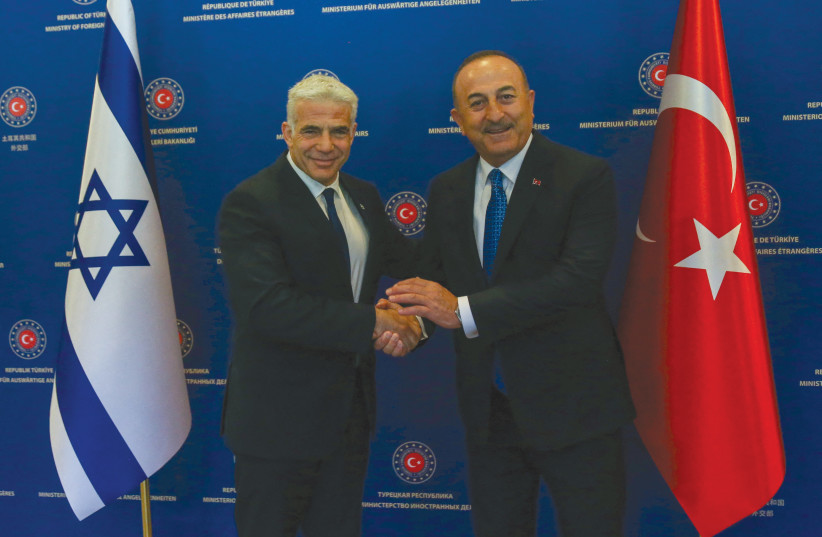An alleged Israeli spy ring targeting people with ties to Iran is Turkey’s latest espionage accusation against its renewed ally.
For more stories from The Media Line go to themedialine.org
The pro-government Daily Sabah newspaper reported on Tuesday that Turkish authorities caught 11 people working for the Mossad, Israel’s intelligence agency. The report comes less than a year after the two countries restored diplomatic relations.
The outlet cited a statement from MIT, Turkey’s intelligence agency, that alleged that the agents were spying on people with trade ties to Iran.
The communications office of Turkish President Recep Tayyip Erdoğan did not respond to a request from The Media Line to see the MIT statement.
Other accusations of espionage
In December, dozens of people were detained over accusations that they were spying on Palestinians for the Mossad, the Daily Sabah reported.

Aydın Sezer, an Ankara-based foreign policy analyst, said that he doubted the story’s accuracy and that news from pro-government media should be consumed with a skeptical attitude.
“It seems like a very well-crafted story,” Sezer wrote in a message to The Media Line.
He was especially suspicious of a section of the story that alleged that the Mossad agents sent “a threatening package” to a target through the mail.
The story also alleged that the Mossad agents got in contact with a member of a network led by Fethullah Gülen, the Turkish cleric, accused of masterminding the 2016 failed coup attempt against Erdoğan, who currently lives in self-imposed exile in Pennsylvania.
Sezer said that the report was an attempt to connect the Gülen movement, known to the Turkish government as FETÖ, to foreign intelligence agencies.
Gallia Lindenstrauss, a senior research fellow at Israel’s Institute for National Security Studies specializing in Turkish foreign policy, said that the stories were plausible since Israeli intelligence does have serious concerns over threats from Iranians and Palestinians.
She acknowledged, though, that there could be a political motive behind the story coming out less than a week before the Turkish presidential runoff election.
“The leaking now of the story might be also intended to boost the nationalist feelings in the pro-Erdoğan camp ahead of the second round of elections,” she wrote in a message to The Media Line. She said the strategy behind releasing the story probably had to do with bringing out the nationalist base rather than winning over new voters.
The nationalist vote will be crucial for Erdoğan to maintain his position as president. During the first round of presidential elections held on May 14, no candidate gained the majority needed to achieve victory.
Nationalists and ultranationalists did better than expected in the first round, with far-right presidential candidate Sinan Oğan receiving a surprising 5% of the vote. Oğan has since endorsed Erdoğan. If even a portion of Oğan’s supporters shift their support in his direction, Erdoğan, who received 49.5% of the vote in the first round, is likely to win.
News of the alleged Mossad agents comes after Turkey’s state news agency reported that members of the Kurdistan Workers’ Party (PKK), an outlawed Kurdish militia, were arrested while trying to enter Greece through the border with Turkey.
The PKK is categorized as a terrorist organization by the US and Turkey.
Erdoğan’s Justice and Development Party has accused rival presidential candidate Kemal Kılıçdaroğlu of connections to the PKK and the Gülen movement.
Ömer Özkizilcik, a foreign policy and security analyst based in Ankara, said that there likely wasn’t a political motive behind the Mossad agent story.
“Turkish domestic politics are so tense and fast moving that such operations don’t attract significant public attention,” he wrote in a message to The Media Line.
Özkizilcik said that the operation could harm relations between Turkey and Israel, especially since the report alleged that the agents were working with an alleged member of the Gülen movement.
“Likely, recruiting a Gülen sect member appeared tactically and operationally easy. However, tactical decisions can come with strategic costs, and this is such a case. Therefore, this incident will cause more damage than needed in bilateral relations,” Özkizilcik wrote.
He called on Israel to collaborate with Turkish intelligence forces.
Turkey and Israel announced in August 2022 that they would restore full diplomatic relations after years of strained ties.
